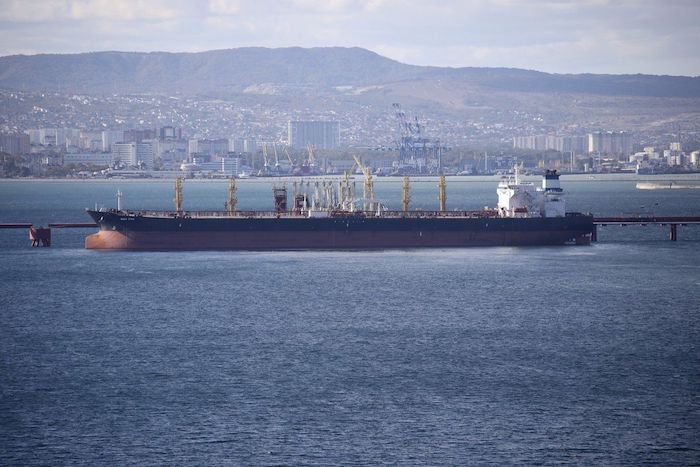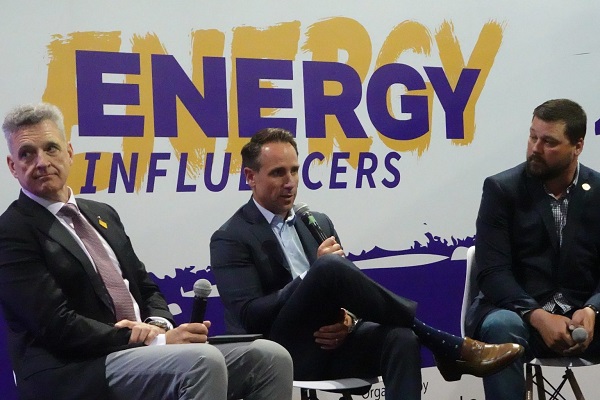Energy
Russia says it will cut oil production over Western caps

By David Mchugh And Vladimir Isachenkov in Moscow
MOSCOW (AP) — Russia announced Friday that will cut oil production by 500,000 barrels per day next month after Western countries capped the price of its crude over its action in Ukraine.
“As of today, we fully sell all our crude output, but as we stated before, we will not sell oil to those who directly or indirectly adhere to the ‘price ceiling,’” Deputy Prime Minister Alexander Novak said in remarks carried by Russian news agencies.
“In connection with that, Russia will voluntarily cut production by 500,000 barrels a day. It will help restore market-style relations,” he said.
Analysts have said one possible Russian response to the cap would be to slash production to try to raise oil prices, which could eventually flow through to higher gasoline prices at the pump as less oil makes it to the global market.
International benchmark Brent crude rose 2.2% Friday, to $86.42 per barrel.
The Group of Seven major democracies have imposed a $60-per-barrel price cap on Russian oil shipped to non-Western countries. The goal is to keep oil flowing to the world to prevent price spikes that were seen last year, while limiting Russia’s financial gains that can be used to pay for its campaign against Ukraine.
The cap is enforced by barring Western companies that largely control shipping and insurance services from moving oil priced above the limit.
Russia has said it will not sell oil to countries observing the cap, a moot point because Russian oil has been trading below the price ceiling recently. However, the cap, an accompanying European Union embargo on most Russian oil and lower demand for crude have meant that customers in India, Turkey and China have been able to push for substantial discounts on Russian oil.
The impact of a cut of 500,000 barrels per day is an open question as a slowing global economy reduces the thirst for oil.
The OPEC+ alliance of oil producers, which includes Russia, tried to boost oil prices with an October announcement that it would cut production by 2 million barrels per day, only to see prices fall below $80 per barrel by December.
Asked if Russia consulted OPEC+ members about Moscow’s new production cut, Kremlin spokesman Dmitry Peskov said “there had been conversations with some members of the OPEC+” before the move was announced. He didn’t offer any details.
But Novak insisted in a statement later that Moscow made the move without consulting anyone.
“It’s a voluntary cut; there have been no consultations with anyone regarding it,” the deputy prime minister said, according to the Russian media.
The new reduction could be “an early sign that Russia might try to weaponize oil supplies after last year’s failed attempt to weaponize natural gas,” said Simone Tagliapietra, an energy policy expert at the Bruegel think tank in Brussels.
But that could be difficult to accomplish because it’s easier to find alternative supplies of oil, traded through tankers that crisscross the globe, than to replace natural gas, which before the war mostly came by pipeline.
Russian exporter Gazprom has cut off most supplies of natural gas to Europe, citing technical issues and refusal by some customers to pay in Russian currency. European officials call it retaliation for supporting Ukraine.
Europe did suffer from resulting high natural gas prices but has managed to replace much of the lost Russian supply from other sources including shipborne liquefied gas from the U.S. and Qatar. Natural gas prices have since come down from all-time highs last summer but are still three times higher than before Russia massed troops on the Ukraine border.
___
McHugh reported from Frankfurt, Germany.
Business
Senator wants to torpedo Canada’s oil and gas industry

From the Fraser Institute
Recently, without much fanfare, Senator Rosa Galvez re-pitched a piece of legislation that died on the vine when former prime minister Justin Trudeau prorogued Parliament in January. Her “Climate-Aligned Finance Act” (CAFA), which would basically bring a form of BDS (Boycott, Divestment, and Sanctions) to Canada’s oil and gas sector, would much better be left in its current legislative oblivion.
CAFA would essentially treat Canada’s oil and gas sector like an enemy of the state—a state, in Senator Galvez’ view, where all values are subordinate to greenhouse gas emission control. Think I’m kidding? Per CAFA, alignment with national climate commitments means that everyone engaged in federal investment in “emission intensive activities [read, the entire oil and gas sector] must give precedence to that duty over all other duties and obligations of office, and, for that purpose, ensuring the entity is in alignment with climate commitments is deemed to be a superseding matter of public interest.”
In plain English, CAFA would require anyone involved in federal financing (or federally-regulated financing) of the oil and gas sector to divest their Canadian federal investments in the oil and gas sector. And the government would sanction those who argue against it.
There’s another disturbing component to CAFA—in short, it stacks investment decision-making boards. CAFA requires at least one board member of every federally-regulated financial institution to have “climate expertise.” How is “climate expertise” defined? CAFA says it includes people with experience in climate science, social science, Indgineuous “ways of knowing,” and people who have “acute lived experience related to the physical or economic damages of climate change.” (Stacking advisory boards like this, by the way, is a great way to build public distrust in governmental advisory boards, which, in our post-COVID world, is probably not all that high. Might want to rethink this, senator.)
Clearly, Senator Galvez’ CAFA is draconian public policy dressed up in drab finance-speak camouflage. But here’s what it would do. By making federal investment off-limits to oil and gas companies, it would quickly put negative pressure on investment from both national and international investors, effectively starving the sector for capital. After all, if a company’s activities are anathema to its own federal regulators or investment organs, and are statutorily prohibited from even verbally defending such investments, who in their right minds would want to invest?
And that is the BDS of CAFA. In so many words, it calls on the Canadian federal government to boycott, divest from, and sanction Canada’s oil and gas sector—which powers our country, produces a huge share of our exports, and employs people from coast to coast. Senator Galvez would like to see her Climate-Aligned Finance Act (CAFA) resurrected by the Carney government, whose energy policy to-date has been less than crystal clear. But for the sake of Canadians, it should stay dead.
Energy
Who put the energy illiterate in charge?

This article supplied by Troy Media.
Canada’s energy policy is being shaped by politicians who don’t actually understand how energy works. That’s not just embarrassing. It’s dangerous
Canada’s energy future is being held back by a critical obstacle: our elected officials don’t understand energy.
At all three levels of government, most politicians lack even a basic grasp of how our energy systems function. That ignorance isn’t just a knowledge gap—it’s a leadership crisis. Energy systems are evolving rapidly, and our leaders are ill-equipped to manage the complexity, tradeoffs and consequences involved. With few exceptions, their understanding is superficial, shaped more by talking points than substance.
By “energy systems,” I mean the complex web of technologies, infrastructure, markets and regulations that generate, distribute and manage power—from oil and gas to hydro, nuclear, wind and solar. These systems are deeply interconnected, constantly changing and central to every aspect of modern life. Yet the people making decisions about them often have little idea how they actually work.
This shows up frequently in public life: dodged questions, scripted answers, vague platitudes. Many politicians skate across the surface of issues with the thinnest understanding. The old adage “a little knowledge is a dangerous thing” perfectly describes Canadian energy politics today.
Decisions about energy directly affect household utility bills, climate goals, industrial competitiveness and grid reliability. Yet politicians tend to be tethered to the dominant energy source in their own region—oil and gas in Alberta, hydro in Quebec, nuclear in Ontario—without grasping how those systems connect or conflict. Canada’s energy landscape is fragmented, with each province operating under its own regulatory framework, infrastructure constraints and political pressures. That makes coordination difficult and systems-level thinking essential.
This isn’t a left-versus-right issue. It’s not oil and gas versus renewables. It’s a national failure to understand the integrated systems that power our lives and economy. Canada is, functionally, energy illiterate, and our elected officials reflect that reality. We flip a switch, pump gas, turn up the thermostat and rarely ask how or why it works, or what it costs in environmental or economic terms.
Take the Clean Electricity Regulations as one example. Introduced by the federal government to drive Canada’s electricity grid to net-zero emissions by 2035, the CERs require provinces to sharply reduce or eliminate fossil fuel-based power. But in Alberta and Saskatchewan, where coal and natural gas still dominate, those regulations landed with a thud. The federal government failed to account for regional infrastructure limitations, market structure
differences and technology readiness. The result? Immediate backlash, legal threats and political gridlock—not because climate action is unwelcome, but because the policy was crafted in a vacuum of systems-level understanding.
Adding to the problem is the dominance of bureaucrats and political handlers in shaping what passes for energy messaging. Speeches are often a patchwork of statistics and sanitized clichés, stripped of nuance or depth. Many politicians simply deliver what they’re handed, guided more by risk management than insight. The result is policy that’s disconnected from the realities it aims to change.
A handful of elected officials do have real-world energy experience, but even that is often narrow, based on one role or one sector. It rarely translates into the kind of broad, integrated knowledge needed to lead across multiple interdependent systems. The risks of this fragmented thinking are immense.
What’s needed is mandatory education—an energy information and insights toolkit for anyone seeking public office. This shared curriculum would cover how electricity and fuel systems work, the economics of energy markets, climate dynamics, environmental trade-offs and public policy principles. It should be grounded in both natural and social sciences and structured to develop systems thinking, so that decisions are informed by how energy technologies, markets and governance truly interact.
Imagine if thousands of politicians—urban and rural, left and right, federal and local—learned from the same textbook. Politics wouldn’t vanish. Disagreements wouldn’t disappear. But the debate would shift from tribal talking points to informed discussion.
And for once, Canada might start moving forward on energy, not with noise or paralysis, but with purpose.
Bill Whitelaw is a director and advisor to many industry boards, including the Canadian Society for Evolving Energy, which he chairs. He speaks and comments frequently on the subjects of social licence, innovation and technology, and energy supply networks.
Troy Media empowers Canadian community news outlets by providing independent, insightful analysis and commentary. Our mission is to support local media in helping Canadians stay informed and engaged by delivering reliable content that strengthens community connections and deepens understanding across the country.
-

 espionage2 days ago
espionage2 days agoFrom Sidewinder to P.E.I.: Are Canada’s Political Elites Benefiting from Beijing’s Real Estate Reach?
-

 Bruce Dowbiggin1 day ago
Bruce Dowbiggin1 day agoFUBAR: How Trudeau & Trump Rewrote This Century’s Political Handbook
-

 Alberta2 days ago
Alberta2 days agoAlberta’s carbon diet – how to lose megatonnes in just three short decades
-

 Business1 day ago
Business1 day agoSenator wants to torpedo Canada’s oil and gas industry
-

 Energy2 days ago
Energy2 days agoWho put the energy illiterate in charge?
-

 Agriculture2 days ago
Agriculture2 days agoUnstung Heroes: Canada’s Honey Bees are not Disappearing – They’re Thriving
-

 espionage2 days ago
espionage2 days agoFBI Buried ‘Warning’ Intel on CCP Plot to Elect Biden Using TikTok, Fake IDs, CCP Sympathizers and PRC Students—Grassley Probes Withdrawal
-

 David Clinton2 days ago
David Clinton2 days agoWhy Are Ontario’s Public Schools So Violent?








